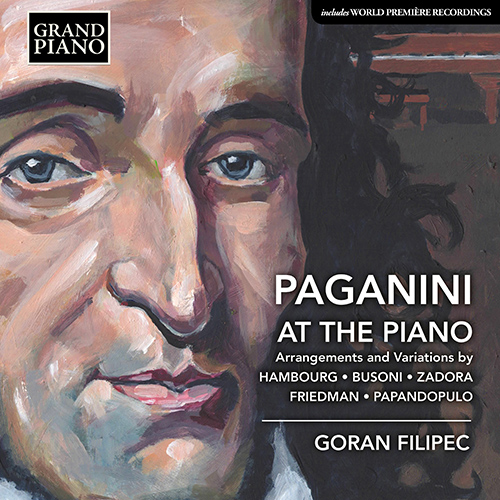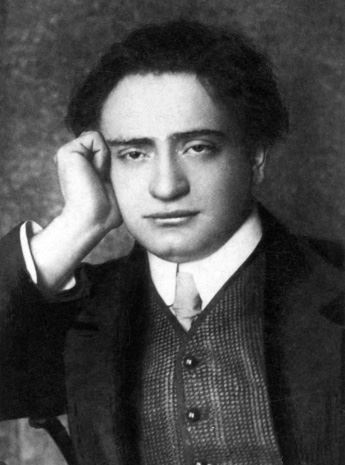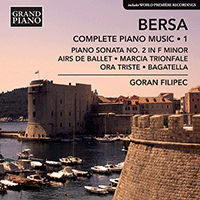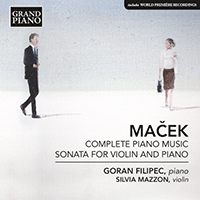
About this Release
“Paganini, who already during his lifetime became an icon of instrumental virtuosity, inspired Liszt and other pianists of the so-called grand manner, to arrange his pieces for piano or write variations on some of his themes. These works feature instrumental brilliance and are, as a rule, demanding for the performer from the virtuosic point of view. The present edition includes excellent arrangements by Michael Zadora, and the variations by Mark Hambourg which were never recorded previously, as well as very rarely played variations by Ignaz Friedman and Busoni's Introduzione e Capriccio (Paganininesco). The Croatian composer Boris Papandopulo joins them with his arrangements of three Capriccios After Paganini, in a quiet later style.” — Goran Filipec
PAGANINI AT THE PIANO
(arr. and var. by Hambourg • Busoni • Zadora • Friedman • Papandopulo)
- Goran Filipec, piano
In the years between 1902 and 1914 some of the world’s greatest pianists published a series of works that explored the lyricism and virtuosity of Paganini’s Caprices. Busoni was the greatest figure among them, but he considered Mark Hambourg to be the greatest pianistic talent of his generation. Both Michael Zadora and Ignaz Friedman carried out inventive free transcriptions while years later the Croatian Boris Papandopulo infused the pungent flavours of mid-20th-century idioms into the genre.
This recording was made on a modern instrument: Shigeru Kawai EX
Tracklist
|
Hambourg, Mark
|
|
1
Variations on a theme by Paganini (1902) * (00:15:58)
|
|
Busoni, Ferruccio
|
|
2
An die Jugend: IV. Introduzione e Capriccio (Paganinesco) (1909) (00:05:44)
|
|
Zadora, Michael
|
|
3
Eine Paganini-Caprice (1911) * (00:06:24)
|
|
Paganini, Niccolò
|
|
4
24 Caprices, Op. 1, MS. 25: No. 19 in E-Flat Major (arr. M. Zadora for piano) (1913) * (00:02:56)
|
|
Friedman, Ignaz
|
|
5
Studies on a Theme by Paganini, Op. 47b (1914) (00:16:00)
|
|
Papandopulo, Boris
|
|
3 Capriccios after Paganini (1981) (00:07:41 )
|
|
6
No. 1. Corrente (after Paganini's Op. 1, No. 18) * (00:02:20)
|
|
7
No. 2. Moderato (after Paganini's Op. 1, No. 14) * (00:02:10)
|
|
8
No. 3. Ad libitum - Agitato (after Paganini's Op. 1, No. 5) * (00:03:10)
|
The Artist(s)
 A pianist of fiery energy and captivating performing style inspired by the legendary piano traditions of the early 20th century, Goran Filipec (Rijeka, 1981) is acclaimed by critics from Argentina to New York and London for his “poetic, brilliant and refined performances”. Primarily renowned as a remarkable Lisztian, Goran Filipec endeavours in the domain of musical interpretation consist primarily of the perpetual rediscovery of emotional values of the music in question, and its relative subtraction from historicisation. Starting from this point, Filipec creates vibrant audible representations of the interpreted music in the spirit of the so-called "grand style," which occasionally unites interpretation and arrangement.
A pianist of fiery energy and captivating performing style inspired by the legendary piano traditions of the early 20th century, Goran Filipec (Rijeka, 1981) is acclaimed by critics from Argentina to New York and London for his “poetic, brilliant and refined performances”. Primarily renowned as a remarkable Lisztian, Goran Filipec endeavours in the domain of musical interpretation consist primarily of the perpetual rediscovery of emotional values of the music in question, and its relative subtraction from historicisation. Starting from this point, Filipec creates vibrant audible representations of the interpreted music in the spirit of the so-called "grand style," which occasionally unites interpretation and arrangement. The Composer(s)
 The son of an Italian musician father and a German pianist mother, Ferruccio Busoni represented a remarkable synthesis of two differing attitudes to music, while winning an outstanding reputation as a piano virtuoso.
The son of an Italian musician father and a German pianist mother, Ferruccio Busoni represented a remarkable synthesis of two differing attitudes to music, while winning an outstanding reputation as a piano virtuoso.  Friedman’s compositions are largely miniatures even if grouped into sets. He is the master of the character piece. Writing in late German Romantic style, his compositions are often harmonically complex although tonal. Friedman does not employ the sensuality of a Scriabin or a Szymanowski but allows the beauty and poignancy of the melody to shine. Rhythms are traditional and within the genre depicted. Pianistically accessible, Friedman’s works demand technical and musical perfection.
Friedman’s compositions are largely miniatures even if grouped into sets. He is the master of the character piece. Writing in late German Romantic style, his compositions are often harmonically complex although tonal. Friedman does not employ the sensuality of a Scriabin or a Szymanowski but allows the beauty and poignancy of the melody to shine. Rhythms are traditional and within the genre depicted. Pianistically accessible, Friedman’s works demand technical and musical perfection.  Born in Russia, Mark Hambourg (1879–1960) was encouraged by Padereweski to study in Vienna with Theodor Leschetizky, under whose tutelage he made a very favourable impression on Brahms as well as the conductors Hans Richter and Felix Weingartner. Some years later, Ferruccio Busoni told Henry Wood that he considered Hambourg to be the greatest pianistic talent of his generation. After taking British citizenship at the age of 17, he rapidly established himself as a permanent fixture in the musical calendar of his adopted country. Although he was a pianist in the uninhibited ‘grand manner’ of 19th-century giants like Anton Rubinstein, Hambourg was one of the first concert artists to embrace the new technology of gramophone recording and he made his first records as early as 1909. Debussy, Scriabin, Rachmaninov, Falla, Arne, Handel and Domenico Scarlatti are but a few of the varied composers who appear in his extensive list of recordings.
Born in Russia, Mark Hambourg (1879–1960) was encouraged by Padereweski to study in Vienna with Theodor Leschetizky, under whose tutelage he made a very favourable impression on Brahms as well as the conductors Hans Richter and Felix Weingartner. Some years later, Ferruccio Busoni told Henry Wood that he considered Hambourg to be the greatest pianistic talent of his generation. After taking British citizenship at the age of 17, he rapidly established himself as a permanent fixture in the musical calendar of his adopted country. Although he was a pianist in the uninhibited ‘grand manner’ of 19th-century giants like Anton Rubinstein, Hambourg was one of the first concert artists to embrace the new technology of gramophone recording and he made his first records as early as 1909. Debussy, Scriabin, Rachmaninov, Falla, Arne, Handel and Domenico Scarlatti are but a few of the varied composers who appear in his extensive list of recordings. Reviews
“The longer one hears the recording, the more one moves away from initial skepticism to enthusiasm… The whole of the 19th century is represented in these arrangements, and Filipec presents them to us as if on a silver plate: glittering, fiery and powerful in sound—simply brilliant.” – Piano News
“Filipec is an exciting prospect and his programme is most valuable. ” – Gramophone
“Goran Filipec is a powerhouse pianist, and it’s just as well because no less would do for the repertoire on his latest recording” – The WholeNote
“In Filipec, we see his marked and versatile musical personality, the breathtaking virtuosity, the freshness of inspiration, the sense of the grandiose and the magniloquence, the imperious and almost whipping incisiveness of touch, the resolute impetuosity and urgency, the charm and grace…” – La Voce del Popolo

“…this disc offers a chance to hear some fascinating reinterpretations of Paganini’s music on an instrument for which he never wrote, but one that is able to produce effects as impressive in their way as Paganini’s own were on the violin.” – Infodad.com

“Ignaz Friedman’s Paganini Studies operate on a higher level of musical imagination and pianistic ingenuity, and Filipec clearly revels in the idiom, milking the slower variations for all they’re worth, albeit within the bounds of good taste.” – ClassicsToday.com



 Grand Piano has gained a reputation for producing high quality recordings of rare keyboard gems. Dedicated to the exploration of undiscovered piano repertoire, the label specialises in complete cycles of piano works by many lesser-known composers, whose output might otherwise have remained unknown and unrecorded.
Grand Piano has gained a reputation for producing high quality recordings of rare keyboard gems. Dedicated to the exploration of undiscovered piano repertoire, the label specialises in complete cycles of piano works by many lesser-known composers, whose output might otherwise have remained unknown and unrecorded.






